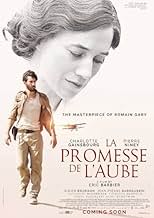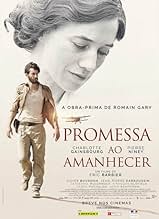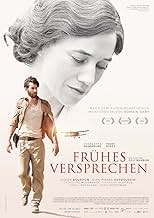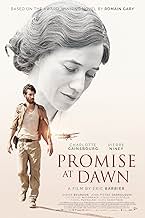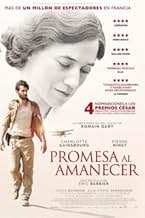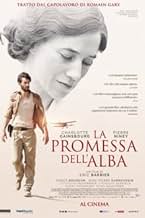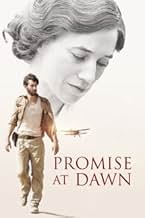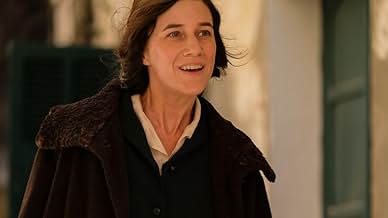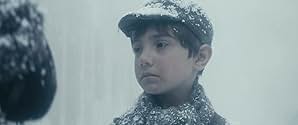La promesse de l'aube
- 2017
- Tous publics
- 2h 11m
IMDb RATING
7.1/10
4.1K
YOUR RATING
A man recounts his life, from his childhood through his experiences in World War II, and the story of his self-sacrificing mother, who raised him alone.A man recounts his life, from his childhood through his experiences in World War II, and the story of his self-sacrificing mother, who raised him alone.A man recounts his life, from his childhood through his experiences in World War II, and the story of his self-sacrificing mother, who raised him alone.
- Director
- Writers
- Stars
- Awards
- 1 win & 7 nominations total
- Director
- Writers
- All cast & crew
- Production, box office & more at IMDbPro
Featured reviews
Absolutely DIVINAL! Majestic interpretations and how history grabs you to the screen is remarkable
La promesse de l'aube (2017) is a French film shown in the U.S. with the translated title Promise at Dawn. The movie was co-written and directed by
Eric Barbier, based on a novel by Romain Gary. This is an autobiographical film, in which Gary is portrayed by Pierre Niney.
Gary was born in Poland, but became a renowned author in France. Some of what's in the movie is factual. The facts are exciting--Gary moved to France, and when the Germans conquered France, he joined the RAF.
One of the most exciting scenes in the movie shows Gary, as the navigator of a RAF bomber, talking the pilot--who is temporarily blinded--to the bombing target, and then back to the RAF airfield. (This actually happened.)
However, the movie isn't about Romain Gary's daredevil life. It's about Romain Gary and his mother, Nina Kacew, played by Charlotte Gainsbourg. If we are to believe the author, his mother played an immense role in his life--teaching him what he had to know, urging him on, and coming to him in dreams and hallucinations when she wasn't actually with him.
Who could have told us--other than Gary--how much of this was true? True of not, it certainly makes for an interesting script. The script only works because Gainsbourg is such a great actor. She's not always someone we like, but she's someone in whom we believe. I don't know another actor who could have pulled this off as well.
Incidentally, there's a confusing episode when the film starts. It's Day of the Dead in a small city in Mexico, and someone--we later learn that it's Gary--decides that he's dying and needs to go to a distant hospital in Mexico City.
Notice that the talented Catherine McCormack plays his wife, Lesley Blanch. Gary was a diplomat, and he and his wife were stationed in Mexico for a time, so maybe this really happened. (Gary later divorced Blanch and married Jean Seberg, darling of the French Nouvelle vague.)
I enjoyed this movie and would recommend it for people who like epics about famous, successful people. Promise at Dawn has a moderately strong IMDb rating of 7.2. I thought it was better than that, and rated it 8.
Gary was born in Poland, but became a renowned author in France. Some of what's in the movie is factual. The facts are exciting--Gary moved to France, and when the Germans conquered France, he joined the RAF.
One of the most exciting scenes in the movie shows Gary, as the navigator of a RAF bomber, talking the pilot--who is temporarily blinded--to the bombing target, and then back to the RAF airfield. (This actually happened.)
However, the movie isn't about Romain Gary's daredevil life. It's about Romain Gary and his mother, Nina Kacew, played by Charlotte Gainsbourg. If we are to believe the author, his mother played an immense role in his life--teaching him what he had to know, urging him on, and coming to him in dreams and hallucinations when she wasn't actually with him.
Who could have told us--other than Gary--how much of this was true? True of not, it certainly makes for an interesting script. The script only works because Gainsbourg is such a great actor. She's not always someone we like, but she's someone in whom we believe. I don't know another actor who could have pulled this off as well.
Incidentally, there's a confusing episode when the film starts. It's Day of the Dead in a small city in Mexico, and someone--we later learn that it's Gary--decides that he's dying and needs to go to a distant hospital in Mexico City.
Notice that the talented Catherine McCormack plays his wife, Lesley Blanch. Gary was a diplomat, and he and his wife were stationed in Mexico for a time, so maybe this really happened. (Gary later divorced Blanch and married Jean Seberg, darling of the French Nouvelle vague.)
I enjoyed this movie and would recommend it for people who like epics about famous, successful people. Promise at Dawn has a moderately strong IMDb rating of 7.2. I thought it was better than that, and rated it 8.
A skilfully made bio-pic with really inpregnating and 'wise' words on the male psychy
Production is round and very professional.
The film is almost entirely told as a flash-back, in which the life of the tormented writer is told in his own words. It is the equally gruesome, as beautifully told "confession" of a crushing motherly love and the destruction of the child's psyche under that pressure. All storylines are more than interesting, the two actors shine, but there is a postponed climax on script level. When it's there - horrific in it's consequences - we are one hour and a half in the movie. And that is too long to keep the attention fully focused.
The horrific consequences of the destructive mother lie at a deeper level of development of the writer and, in my opinion, should have been expressed less poetically and more realistically. But that is a style choice. It's a French movie after all, right?
Nonetheless, with great pleasure and deliberation, I have looked at the ode to a ruined life, where the talent of being a writer turns out to be both a victory and a curse.
The film is almost entirely told as a flash-back, in which the life of the tormented writer is told in his own words. It is the equally gruesome, as beautifully told "confession" of a crushing motherly love and the destruction of the child's psyche under that pressure. All storylines are more than interesting, the two actors shine, but there is a postponed climax on script level. When it's there - horrific in it's consequences - we are one hour and a half in the movie. And that is too long to keep the attention fully focused.
The horrific consequences of the destructive mother lie at a deeper level of development of the writer and, in my opinion, should have been expressed less poetically and more realistically. But that is a style choice. It's a French movie after all, right?
Nonetheless, with great pleasure and deliberation, I have looked at the ode to a ruined life, where the talent of being a writer turns out to be both a victory and a curse.
Watched it on a recent flight to Paris and glad that I did since I probably wouldn't have paid to see it (not the biggest Gainsbourg fan) and would've missed out on a modern classic. The two main characters in the film, the mother (Gainsbourg) and the son (Niney) carry the film due to the inspired performances of the actors playing those roles. Gainsbourg, in particular, gave a finely-tuned, nuanced performance that perfectly captured the extraordinarily devoted yet overbearing character of Nina; I'm now a big fan! Also inspired were the cinematography and the breathtaking dogfight scenes, which were probably the best I've seen in any war film. The first half of the film does meander a bit and the pace of it gets a bit patchy (hence the 9 stars instead of 10) but the second half more than makes up for it. I didn't know the film was based on a true story (i.e. Romain Gary's biography) until I read the closing credits, which made it that much more impactful and emphatic since real people actually lived the epic events portrayed in the film. The closing credits also had another shock but I won't reveal it here so that I won't spoil the film! All in all, this was probably the best film I've seen in a long while; it felt genuine, engrossing and it left me with tears in my eyes, though the airplane food may have contributed to that.
The demands in the name of love seem too harsh, even absurd. Maternal love is great, and so it is. But I don't think the maternal love in this film deserves to be publicized. The greatness here is entirely due to Roman's success. If Roman did not succeed, is there a circle in his maternal love. Roman's success depends on faith and luck. Mother's love is great, and it's hard to have a second Roman.
Did you know
- TriviaTo prepare the character of Nina, actress Charlotte Gainsbourg admits to have been inspired by her paternal grandmother, also of Russian origin.
- Quotes
Roman Kacew, dit Romain Gary: I made the promise to straighten the world and lay it at his feet
- ConnectionsFeatured in ACS France (2018)
- SoundtracksThe Twins
Composed by Max Richter
- How long is Promise at Dawn?Powered by Alexa
Details
- Release date
- Countries of origin
- Official sites
- Languages
- Also known as
- Promise at Dawn
- Filming locations
- Bordighera, Imperia, Liguria, Italy(Interior and exterior scenes)
- Production companies
- See more company credits at IMDbPro
Box office
- Gross worldwide
- $9,242,157
- Runtime2 hours 11 minutes
- Color
- Aspect ratio
- 2.39 : 1
Contribute to this page
Suggest an edit or add missing content



